For the purpose of my MSc thesis (2021), I have conducted a research project in order to reveal how cultural dimensions theorised by Hofstede affect the retrospective sociotropic economic voting. It was a nice topic that could result in an exploratory research project in the near future (if I decide to go further on my academic life as a PhD student, of course 🙂 ). You can find answers on what is economic voting and the cultural dimensions theory, and the results of the research that helped me to understand the relationship between them better.
Economic voting and cultural dimensions
Economic voting represents a type of voting behaviour that shaped by citizens’ evaluations regarding the past performance or future outlook on personal or national condition of economy. There are two scopes that can be used for the classification of it: time and target range.Time represents the first scope of economic voting. As its name signifies, it approaches to economic voting in a bipolar, unidimensional line: the effect of experiences from the past, and the effect of future expectations. Retrospective voting, in this vein, covers how past economic experiences of a voter echoes to voting behaviour, and prospective one puts emphasis on the role of future economic expectations. Target range, as a second scope, considers two targets: individuals (or households) budget, and national economy.
Cultural dimensions, on the other hand, is a framework of cross-cultural conceptualisations contributed by Geert Hofstede enabling the cross-cultural classification and measurement of cultural differences through dimensions including power distance, uncertainty avoidance, individualism versus collectivism,
masculinity versus femininity, indulgence versus restraint, and long- versus short-term orientation.
Hypotheses development and data analysis.
To analyse the effect of cultural dimensions over the retrospective sociotropic voting behaviour in the Europe between 2009 and 2019, it is logical to use several hypotheses:
- H1a: Power Distance (PDI) affects retrospective sociotropic economic voting.
- H1b: Uncertainty Avoidance (UAI) affects retrospective sociotropic economic voting.
- H1c: Individualism (IDV) affects retrospective sociotropic economic voting.
- H1d: Masculinity (MAS) affects retrospective sociotropic economic voting.
- H1e: Long-term Orientation (LTO) affects retrospective sociotropic economic voting.
- H1f: Indulgence (IVR) affects retrospective sociotropic economic voting.
These hypotheses were tested through quantitative analysis of secondary, cross-sectional survey data of 26 countries provided by European Election Studies for 2009, 2014 and 2019, and cultural dimensions data provided by Geert Hofstede that includes country scores that was generated through factor analysis conducted by himself. Random effects probit regression model were applied for each hypotheses:
![]()
![]()
![]()
![]()
![]()
Dependent variable of this model is vote choice that has been dummy-coded, so incumbent party choice has been coded as “1” and others coded as “0”. Retrospective sociotropic economic evaluation of the national economic circumstances for the past 5 years is the first independent variable, and cultural dimension score for each country is the second independent variable. To assess the marginal effect of culture over economic evaluation, interaction point between both independent variables has been added as a third one. I have used STATA to apply this model on the data. First of all, I have combined all data to a single dataset file (.dta) that enabled me to do the data-entry tasks in a more authomatised way. Then, I used code below to get results, and transmit them to the dedicated Microsoft Word document (.doc) for each.
xtoprobit VoteChoiceNAT c.RetroSoc##c.PDI i.year
outreg2 using PDI.doc, replace ctitle(PDI)
xtoprobit VoteChoiceNAT c.RetroSoc##c.IDV i.year
outreg2 using IDV.doc, replace ctitle(IDV)
xtoprobit VoteChoiceNAT c.RetroSoc##c.MAS i.year
outreg2 using MAS.doc, replace ctitle(MAS)
xtoprobit VoteChoiceNAT c.RetroSoc##c.UAI i.year
outreg2 using UAI.doc, replace ctitle(UAI)
xtoprobit VoteChoiceNAT c.RetroSoc##c.LTO i.year
outreg2 using LTO.doc, replace ctitle(LTO)
xtoprobit VoteChoiceNAT c.RetroSoc##c.IVR i.year
outreg2 using IVR.doc, replace ctitle(IVR)The statistically significant results point that the high levels of power distance, uncertainty avoidance and masculinity strengthen the retrospective sociotropic economic voting, but high levels of long-term orientation and indulgence reduces it. However, no significant result on the influence of individualism could be found. Discrete changes in the probability to vote for incumbent while having good evaluations on the past performance of the national economy reveals that retrospective sociotropic economic voting has been intensified since 2009. In conclusion, all cultural dimensions affect the retrospective sociotropic economic voting in Europe, except the individualism. Marginal effect graphs for the interaction points also can be seen below:
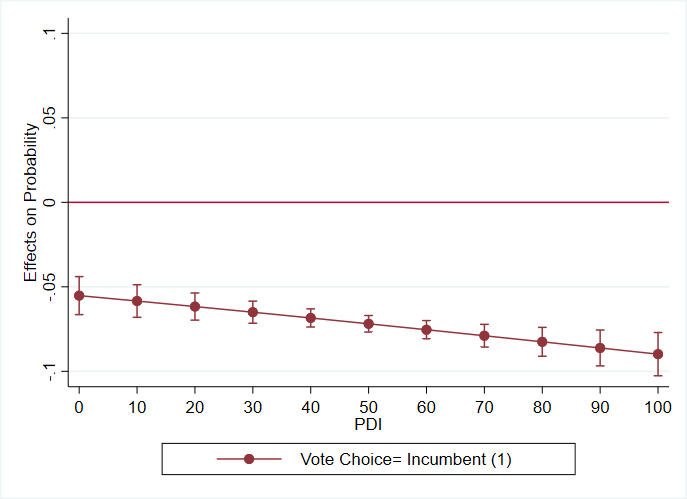
Average marginal effects graph for the power distance (PDI) dimension over probability to vote for incumbent, with 95% confidence intervals.While the PDI score was high, average marginal effect of unit inclination of worse retrospective evaluations on the probability to vote for incumbent less than the one when PDI score is low, which means probability to vote for incumbent having better evaluations on the economy (so the retrospective sociotropic voting) was stronger at higher PDI scores.
Average marginal effects graph for the uncertainty avoidance (UAI) dimension over probability to vote for incumbent, with 95% confidence intervals. When unit inclination to have worse retrospective sociotropic evaluation occurred, the probability to vote for incumbent decreased more at high UAI scores, rather than low scores, so when uncertainty avoidance is high, likelihood to vote for incumbent while having better retrospective sociotropic evaluations on national economy increases.
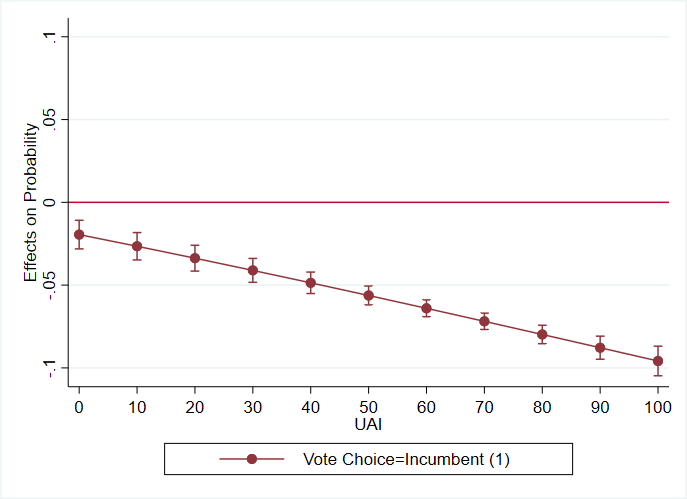
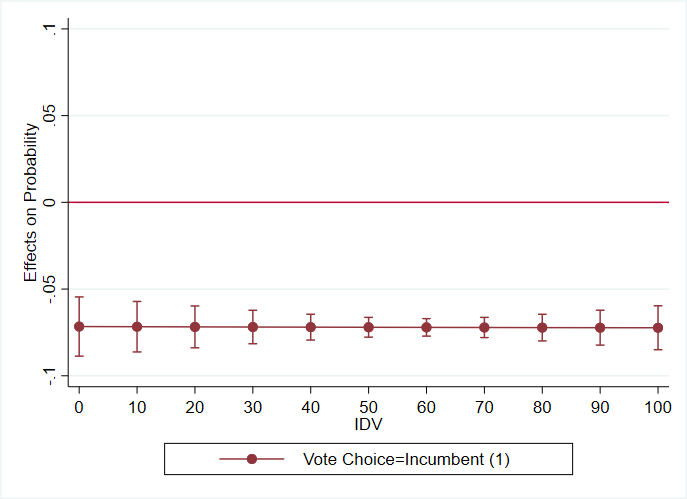
Average marginal effects graph for the individualism (IDV) dimension over probability to vote for incumbent, with 95% confidence intervals.Regardless of the changing level of individualism-collectivism score, there had been no change in the average marginal effect of the economic evaluations on the probability to vote for incumbent; thus, which implied a non-existence of moderating effect of the low IDV score (which highly means collectivist cultural structure) and high IDV score (that signifies exceedingly individualistic culture).
Average marginal effects graph for the masculinity (MAS) dimension over probability to vote for incumbent, with 95% confidence intervals.When the masculinity variable was high, the decrease in the probability on incumbent vote having bad economic evaluations was higher than ones for the low-masculinity scores, which implies that when the MAS score was high, it was more likely to vote for incumbent while having better economic evaluations, which also a sign of moderating effect by the masculinity.
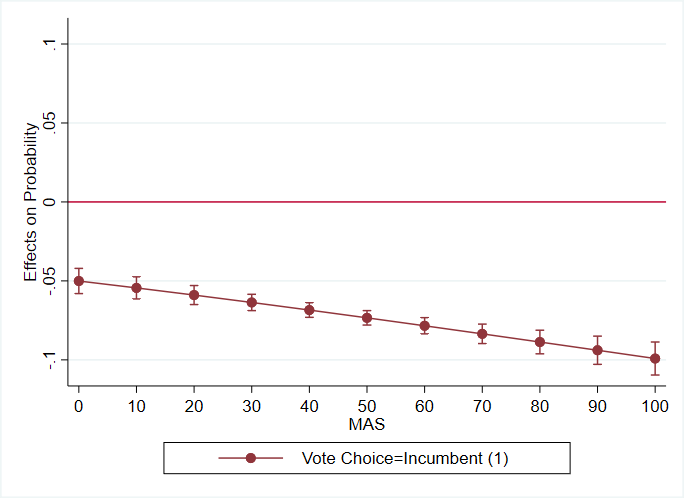
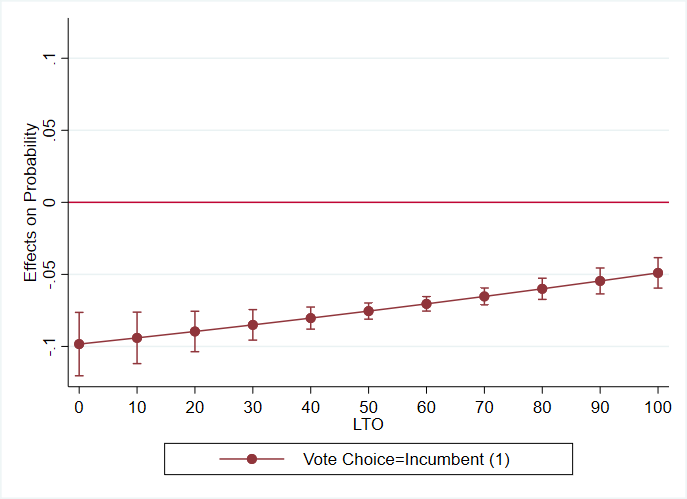
Average marginal effects graph for the long-term orientation (LTO) dimension over probability to vote for incumbent, with 95% confidence intervals.Unlike models for other hypotheses, the probability to vote for incumbent while having better evaluations on past performance of national economy was higher on having low LTO scores. Which meant, the strength of moderation effect of higher LTO scores on retrospective sociotropic economic evaluations were less than lower LTO scores.
Average marginal effects graph for the indulgence (IVR) dimension over probability to vote for incumbent, with 95% confidence intervals.When IVR was low, marginal change in the probability to vote for incumbent while having better economic evaluations was stronger than when the IVR was high.
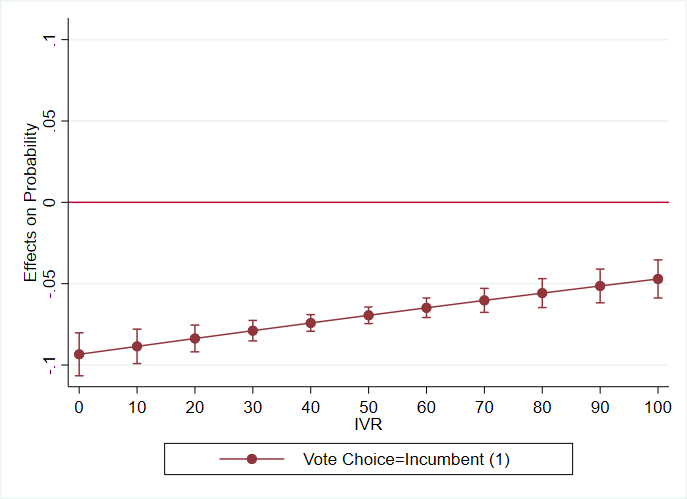
References
- Gökhan, A. B. (2021). Cultural Dimensions and Retrospective Sociotropic Economic Voting: an European Analysis (Unpublished master’s thesis). Vrije Universiteit Brussel, Brussels, Belgium.